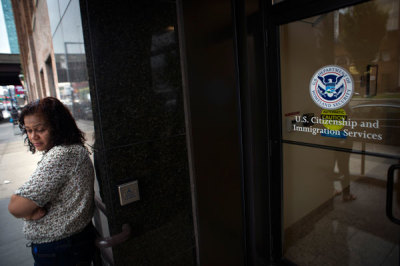Why Congress must make TPS protections permanent

Every year, thousands of people seek asylum in the United States. Violence, danger, and natural disasters drive them out of their country of birth to seek safety, new opportunities, and a new home.
I know this firsthand because I was one of them.
Over 30 years ago, I lived in El Salvador, which was in the midst of a violent civil war. I knew that if I remained in the country, my life would be in danger.
I would be forced to either join the army or become part of a guerilla warfare group.
However, in the midst of fear and instability, God met me right where I was and reminded me to have hope. Through His provision, my younger sister and I received the opportunity to flee El Salvador and come to the U.S. at the end of 1990. Though I was denied asylum when I first arrived in 1990, I remained in the U.S. in order to ensure that my sister and I remained safe from the threat of violence back home.
Thankfully, Congress established Temporary Protected Status (TPS) in 1990 and began granting temporary status to nationals of El Salvador. The following year, I received TPS and was able to find a safe haven in the U.S. The program allows migrants like myself, whose home countries are considered unsafe, the right to live and work in the U.S. for a temporary time. However, because the program is temporary, TPS recipients have to continually reapply every 12 to 18 months.
While TPS recipients like me are grateful for the opportunity to call the U.S. home, the temporary nature of our status here forces us to hold the idea of home lightly. There is currently no pathway to permanent legal residency, only a constant repetition of applying for TPS and living under the fear that our applications will be rejected.
Congress can end this state of legal limbo by passing bipartisan immigration reform that removes the cloud of uncertainty that TPS recipients like myself constantly live under and provides a pathway to legal permanent status and, eventually, citizenship.
There are over 320,000 TPS recipients in the United States, including over 13,000 in my home state of North Carolina. We contribute to the economy, build meaningful relationships in our communities, and worship in local churches. Thousands of TPS recipients like me have called this country home for a long time. TPS recipients from El Salvador must prove they have lived and worked in the United States for at least 20 years. And many recipients, like myself, arrived in the U.S. much earlier than that.
Annually, TPS recipients contribute nearly $14 billion to our national GDP. North Carolina alone would lose out on over $570.1 million annually without these contributions.
Providing a pathway to permanent citizenship would be a net benefit for our state and country. It would not only provide certainty for TPS recipients like me but would also benefit North Carolina by delivering stability to the communities that have come to rely upon us.
Fortunately, a solution already exists. In 2021, the House passed the American Dream and Promise Act, which includes further protections and a path to citizenship for TPS recipients. As the Senate continues to deliberate other bipartisan immigration bills, I pray that senators keep TPS recipients in their hearts and minds as they consider reform.
Our faith should also compel us to advocate for a solution. Scripture reminds us that how we care for the vulnerable among us is a reflection of our love for God. In Matthew 25:40, Jesus says, “whatever you did for the least of these brothers and sisters of mine, you did for me.”
Even after all the adversity TPS recipients overcome to arrive in the U.S., we remain vulnerable for as long as we go without the protection of permanent citizenship.
However, I am grateful to have found a temporary safe haven in the United States. It is here that the Lord first led me to ministry at Nuevo Pacto Ministries in Texas. Eventually, He redirected my path to Greenville, North Carolina, where I started the Tabernacle of Restoration, the Spanish-speaking congregation of Greenville Christian Fellowship.
In my role as a pastor, I connect with many TPS recipients, not only through past struggles of fleeing violence but also the current battle we face with our legal status. Many members of my congregation, including my own daughters, live in fear of being separated from their families.
For the sake of my children and the strength of our North Carolina communities, I urge Congress to take action to provide a pathway to permanent citizenship for TPS recipients. This country is our safe haven and home. I pray that we will be granted a more secure situation that makes it possible for us to continue contributing to the country we now call home.
Nelson Ramos is the pastor of the Spanish-speaking congregation of Greenville Christian Fellowship in Greenville, North Carolina.





















